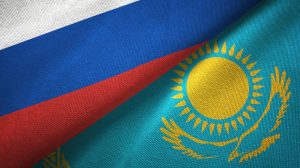The Diplomat author Mercy Kuo regularly engages subject-matter experts, policy practitioners, and strategic thinkers across the globe for their diverse insights into U.S. Asia policy. This conversation with George Voloshin – head of the French branch at Aperio, a corporate risk intelligence consultancy in Paris, and author of “The European Union’s Normative Power in Central Asia: Promoting Values and Defending Interests” – is the 309th in “The Trans-Pacific View Insight Series.”
Explain the agenda of President Kassym-Jomart Tokayev’s efforts to revoke official titles from former President Nursultan Nazarbayev, and the impact on Kazakhstan’s ruling elites and citizenry.
We still do not know what exactly happened between Tokayev and Nazarbayev between January 4, when protests turned violent, and January 6, when the Collective Security Treaty Organization (CSTO) troops – called in by Tokayev as the new chairman of the Security Council (in lieu of Nazarbayev) – began their deployment in Kazakhstan. Nazarbayev and his family’s departure from Kazakhstan’s political life had become a major plank of the still-peaceful protest wave in the first days of January. Not doing that would have been detrimental both to Tokayev’s credibility as president and to the Nazarbayev family’s ability to control the next-most most important thing to them after power: that is, their vast collective wealth.
Although both Tokayev and Nazarbayev have since denied the existence of an alleged power-sharing deal between them, it is more likely than not that a behind-the-scenes deal has been struck. Otherwise, the protests would likely have continued.
Regarding the impact of the domestic political shakeup on local elites, it is too early to tell. The elites have already pledged allegiance to Tokayev, but the president has been keen to avoid open conflict with those still loyal to the Nazarbayev clan and the few undecided. Therefore, I would not expect radical moves against the elites, even those whose loyalty Tokayev might question. Nevertheless, a redistribution of assets – and political power that goes with them – is almost inevitable in the longer term as the Nazarbayev family’s residual influence, mainly over the national economy, shrinks further.
Analyze Moscow’s role in Tokayev’s calculus to neutralize Nazarbayev.
I don’t think that Russia was anyhow involved in neutralizing Nazarbayev. In fact, Nazarbayev was very cordially received by Vladimir Putin in St. Petersburg in late December, just a week before the protests began in western Kazakhstan. In contrast, Tokayev who also was on a working visit to Russia, had a much colder reception at the time.
Moscow’s role consisted in upholding the Tokayev administration at a time when Nazarbayev had already been pushed out of the picture by the exceptional circumstances without a precedent in Kazakhstan’s post-independence history. The CSTO intervention, in which Russia unsurprisingly played the principal role, allowed the Tokayev administration to seize the initiative on the ground, as forcefully as it could.
How are Ukraine-Russian tensions affecting social unrest in Kazakhstan?
I consider the Ukraine-Russia tensions and the January 2022 crisis in Kazakhstan as two completely disconnected events. What happened in Kazakhstan was a purely domestic affair. The initial peaceful protests were the result of years of neglect for ingrained socioeconomic problems, including high hidden unemployment, increasingly wider gaps in wealth and income, a lack of social mobility, and the concentration of all national wealth in the hands of the privileged few. This is one of the reasons why the authorities’ official narrative about 20,000 or so radicals who purportedly came from abroad to attack Kazakhstan’s constitutional order is widely rejected as implausible.
There had been protests before, and the fact that so much violence became possible should be seen in correlation with a high number of young males without sufficient education, professional skills, and stable jobs. What we also need to understand is why the security apparatus, namely the National Security Committee whose former leadership is suspected of treason, apparently deliberately failed to act to prevent the ransacking of Almaty.
How does Kazakhstan fit into Putin’s broader revanchism across the former Soviet states?
Kazakhstan is Russia’s very important military ally and economic partner in the former Soviet space. Together with Belarus, it is Russia’s “best friend,” for lack of better and more reliable friends. In my view, it will be unfair to speak of Russian-Kazakh relations as a vassal-lord relationship or in terms of Russian revanchism within the former USSR. Despite all the highly awkward and even outrageous statements which are repeatedly made by Russian MPs (and never by federal ministers or members of Putin’s administration) in the sense that northern Kazakhstan is a Russian territory, the Putin administration has always been careful not to offend neighboring Kazakhstan’s sensibilities relative to its independence and territorial integrity.
Identify the top three risks U.S. and European policymakers should monitor in Kazakhstan in the context of heightening uncertainty in Ukraine-Russian tensions.
As I mentioned previously, I see the Ukraine-Russia crisis and the events in Kazakhstan as entirely disconnected from each other. In terms of what to watch for, in particular from the perspective of Western businesses and policymakers, I would name the following: any indication of newly emerging mass protests given that the socioeconomic issues Kazakhstan is facing cannot be quickly resolved, making further social unrest a real possibility; any tangible shifts in the elite landscape (because elite stability is a key factor in the country’s overall stability and many Western corporations have close ties to members of the Nazarbayev family and their cronies as well as other oligarchs and their business interests); and any indication of President Tokayev’s intention to reorient Kazakh foreign policy in favor of Russia and/or China at the expense of the West.
On the latter point, I highly doubt that, as a very experienced diplomat, Tokayev will put into question Kazakhstan’s multivector foreign policy built under Nazarbayev.

































